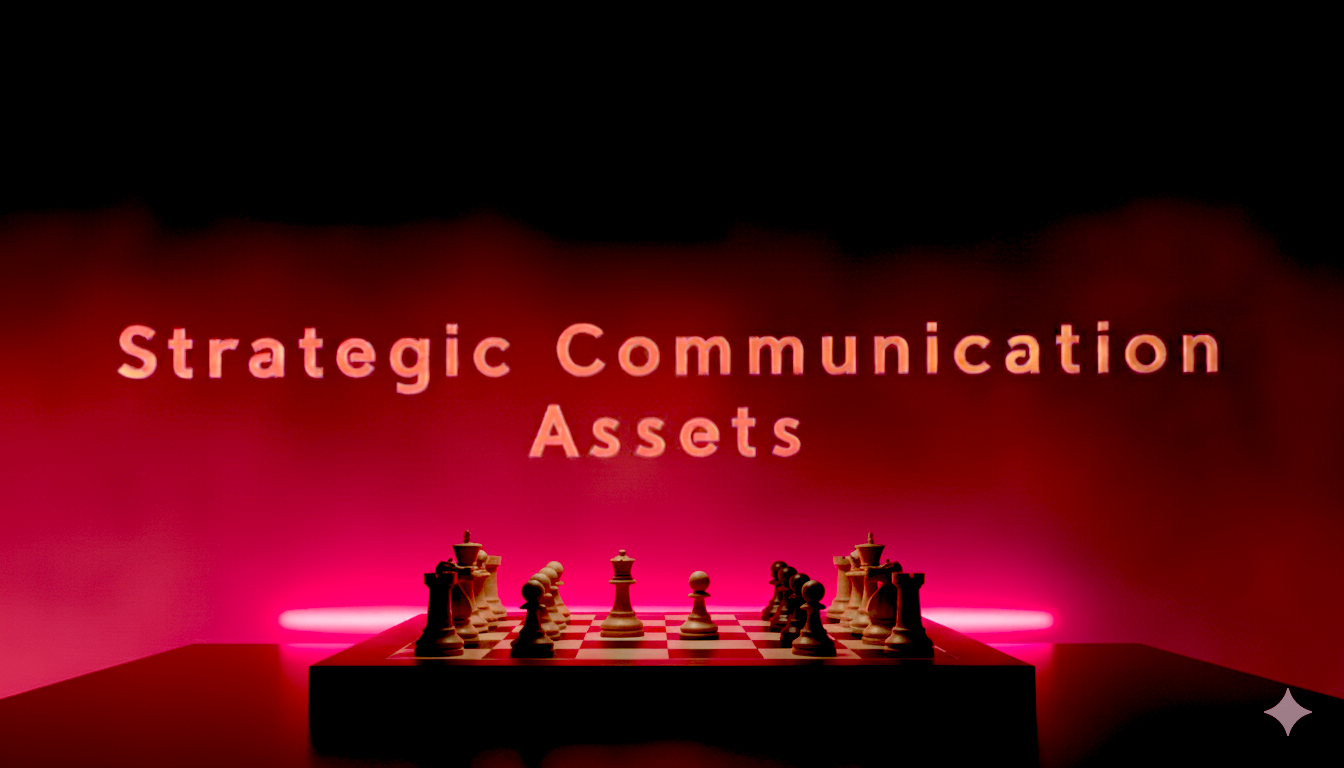Movie Dramaturgy as A Tool In Strategic Communication
Peter Engelmann, October 2025
The global conflict where authoritarian states attack Western democracies and wage genocidal war against them is the most serious matter of our time. Threats and cyber warfare, such as flying drones at European and American airports or cognitive warfare attacks with weaponized social media networks on a gigantic scale, demand the most experienced security experts and the best military to fight back.
How can the entertainment industry, the movie industry, play a role here? Aren’t these issues you don’t play around with?
Well, this isn’t a play here. We don’t play.
It is as serious as it can be.
It is about making a serious contribution but not replacing the expert, the defense professionals.
It is about an additional perspective because writing screenplays and making films are war games. It is about potential scenarios and, equally important, understanding the enemy, unveiling his hidden agenda. We often find “stage plays,” especially when it comes to russia. Manipulating reality in order to use reflexive control over the opponent. Manipulating him, without the victim being aware of what’s happening.
British documentary Filmmaker Adam Curtis raised awareness about Putin’s mastermind, Victor Surkov. Coming from absurd theatres, Surkov turned the whole country into an absurd stage play. Later, Giuliano da Empoli unravelled the dark arts of this master manipulator in https://www.theguardian.com/books/2024/jan/04/the-wizard-of-the-kremlin-by-giuliano-da-empoli-review-a-tsar-is-born
Today, the West is confronted with constant manipulation in the domain of cognitive warfare. Election interference, diplomatic deception, provocation, sabotage, and espionage are only the tip of the iceberg.
The Institute Of The Study of War described the Kremlin’s Strategy of reflexive control in detail: https://understandingwar.org/research/russia-ukraine/denying-russias-only-strategy-for-success-2/
“The Russian strategy that matters most, therefore, is not Moscow’s warfighting strategy, but rather the Kremlin’s strategy to cause us to see the world as it wishes us to see it and make decisions in that Kremlin-generated alternative reality that will allow Russia to win in the real world.” (Institute Of The Study Of War)
In screenwriting, we also create alternative realities. To do so, we need dramaturgy. If we want the audience to believe in something or for viewers to engage with an alternative reality, a series of orchestrated events with turning points is necessary. And most importantly, these events need to have an emotional impact; they must become a story that affects people.
Suppose we could identify dramaturgical patterns in real events. In that case, we have a chance to understand the strategy and goal of our opponent, if these are events which are orchestrated and not coincidental.
Movies and fiction could give us interesting reference points.
How come that?
It is because drama is about human nature. Shakespeare, for example, is tracking and revealing the very core of human existence. Fundamental patterns of existence. Thrillers and political drama are often in-depth studies of power. How does power work? What kind of intrigue do powerful figures use? What is their play? This gives us ideas. Even genre and the conventions of genres are helpful references.
A bad actor who is preparing the future battleground might use the same technique as a horror movie director. He might want to sow chaos with the use of scare tactics. In a horror movie, there are jump scares before an actual attack happens.
In early autumn and the following weeks of autumn 2025, Europe saw a series of threatening events conducted by russia: the incursion of russian drones into Poland. Drone sightings over Denmark and Germany are leading to shutdowns of Airports. Appearance of “green men” at the Estonian border. russian jets are violating NATO airspace. Were they preparations for an imminent attack?
The purpose of these actions seems more grounded in psychological warfare rather than direct preparation for an attack. In horror thriller logic, it is something to do to take the audience to the edge (and the characters in the movie). It’s aiming to create chaos and confusion, and discord among people. It can also be distractions: A wrong lead luring people into the wrong direction.
If we find a familiar pattern, a typical pattern we know, we can predict the potential next steps of the enemy.
Again, this can’t and will never replace the expertise of intel service, military people, or security experts, but it can add a useful perspective.
It can inform the expert what an adversary might do next and what we should be aware of.
This is not fantasy, this is reality. One example is the fight against terrorism:
Even before the September 11 attacks, the US Army sought advice from Hollywood directors and writers:
“Oct. 9 — Even before the Sept. 11 attacks, the U.S. Army had sought Hollywood’s help to help train soldiers to square off with terrorists.
The creative minds behind such hits as Die Hard, MacGyver and The Delta Force held a video conference with officials at the Pentagon last week to discuss advanced virtual reality and simulation technology to aid in training soldiers.
The group, part of the University of Southern California’s Institute for Creative Technology, has been working with the Army since 1999.
“The meeting was not a reaction to the recent events. They [the U.S. Army and USC’s Institute for Creative Technology] have and continue to have a bridge of communication,” said Linda Dorf, a spokeswoman for the ICT. “There were meetings like this before Sept. 11 — just like this one.”
Among the participants in the ICT are Die Hard screenwriter Steven E. De Souza, MacGyver writer David Engelbach, The Delta Force director Joseph Zito and Fight Club director David Fincher.” https://abcnews.go.com/Entertainment/story?id=102006&page=1
How can this be helpful?
The BBC wrote: “Such a scenario – where the army turns to the creators of film fantasy for advice about real-life disaster – would seem an unusual, not to say unlikely, reversal of roles.
But Variety argues that there is much the masters of screen suspense can offer the US Army in the way of tactical advice. In particular, says Variety, the entertainment industry can offer expertise in understanding plot and character, as well as advice on scenario training
Such a scenario – where the army turns to the creators of film fantasy for advice about real-life disaster – would seem an unusual, not to say unlikely, reversal of roles.
But Variety argues that there is much the masters of screen suspense can offer the US Army in the way of tactical advice.”
In particular, says Variety, the entertainment industry can offer expertise in understanding plot and character, as well as advice on scenario training.”
These are the key points:
-Understanding plot and character
– tactical advice
– scenario training.
Movies And Series As Reference Point
The movie industry has an incredible database that could help to fight temporary and future enemies: In thousands of movies and series, every potential scenario has been thought through. Screenwriters need to play war games, and they must often think like a villain.
A good example is the remake of Battlestar Galactica. The series portrays, in the beginning, the devastating potential of cyber attacks. A virus knocks out the digital defense structure, and the defenders are exposed to the Cylons except the Battlestar Galactica. Dune is another example that shows the dangers of enemies within the gates. Homeland is a lecture about how vulnerable the modern Western civilisation and its institutions are, and Game of Thrones might be a precursor of today’s challenge: A civilised world breaking apart when institutions are corrupted and Barbarism rules. In The Expanse, a sci-fi scenario credibly explains why decision-makers can’t avoid shady alliances sometimes. The Alien franchise is a cautionary tale about handing over power, even about security matters, to oligarchs.
It is important to always be clear about one thing: Don’t compare situations 1:1. In the end, the story of a movie follows its own laws, and reality is much more complex than a 100-minute feature film.
But what the writers and filmmakers can provide are good models and potential developments. Most important dramaturgy can help to interpret an adversary’s actions and his agenda: We can break down real events in story beats and see things like through a magnifying glass.
And we can let our fantasies play and identify upcoming threats.
This is particularly important in the new domains of today’s warfare: information wars, hybrid war, cognitive warfare, and psy-ops. Especially the latter is a thing where screenwriters are really experts. They can easily jump into the darkness of the human psyche and sinister plot creations. We can’t predict what happens next like the weather forecaster can tell about tomorrow’s temperature, but professionals from the movie industry can come up with scenarios and the necessary strategic communication competence: Understanding the strategic communication of the enemy – remember reflexive control – and finding proper answers.
Call it “imagineering” or “tactical advice,” contemporary decision makers in the EU and in NATO should recognise the tremendous potential of the entertainment industry in our common fight against the threat Russia and the Crink axis presents.
Even more, the entertainment and movie industry has a huge responsibility here: Movies and series represent our norms and values as a civilisation. We can also support through our product, inspire people, and defend our rule-based world order. The fight against Crink, against authoritarianism and barbarism, is our fight.
Audiovisual Communication
As moviemaking is also a technical thing, a logical further step is to translate knowledge, messages, and powerful answers into audiovisual strategic communication. Endurance Entertainment GmbH has developed proposals in that regard: https://enduranceentertainment.com/audiovisual-tools-ukraine-support/
Decoding The Dramaturgy Of Malicious Misinformation
The entertainment industry can also play an important role in fighting misinformation: Usually, the main concern is how to debunk misinformation and fact-checking. The problem with a lot of misinformation is not the blatant lies but the emotional stories that appeal to people and create emotional responses. The propagandists use dramaturgy. We can help not only debunk the misinformation but also identify the dramaturgical patterns that people get manipulated by. A lot of these stories work like urban legends and leave a deep imprint on society. It’s important to fight all aspects of misinformation.
Defending Western Values With Movies And Series
The last but not least important area of activity refers to the core of creative work of the movie and entertainment industry: From the very beginnings movies and series shape our system of values and norms. Movies can also part of the defense, taking care about what matters to us, freedom, humanity and civilization. A new political awareness in the industry is mandatory. As visionaries filmmakers can fight the negative trends both in society and geopolitics. In 2025 the Marché de Film adressed this in the The Nostradamus Report: https://www.youtube.com/live/eW4rg9832sw?si=lHMV8_4NmBRqbw35
The signal of the Marché du Film is a signal of hope. The next step could be a similar model like the Science and Entertainment Exchange: A regular exchange and plattform where the film industry meets defense and security expert, intel-services, policy makers and military experts fighting cognitive warfare.
Further reading:

